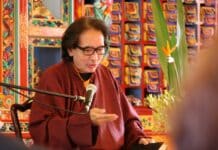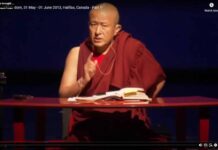
“Fuck you.”
“Did he say, ‘Fuck you’?”
“Yeah. He just said it again.”
To whomever—was it Ginsberg?—on that long ten-tape “Tibetan Buddhism and American Karma” seminar (November, 1971) we were listening to in the winter of ’73 in the Kootenays, bushwhacked ex-american drop-outs in our mid-30s.
Out of the States, yes, but still inseparably connected, wired to the news we’d left, Nixon’s descent, the war we’d organized against and then left because politics as such had become a dead endmissing something we loosely called spiritual, looking for a reality deeper than the dialectics of struggle through working with our hands on the land, holding candle-lit Ramakrishna-inspired satsangs on Sunday evenings, attended by New Age outlaw territory draft-dodgers, drug smugglers/growers, whole earth bushfreak refugees on the run from materialism.
Well, Rinpoche blew a hole in all that with Cutting Through. He obliterated it. He took on the whole culture, all of it. He was not pure and he appealed to us—to me—because of that. In street-immediate language, Rinpoche brought spirituality down to an act I could practice, without having to change clothes, food, homes or jobs. There was a softness, a looseness and an intense color that clothed an intellectual rigor and an inscrutably seductive style that, if such things appealed to you, were irresistible.
Just as the West had once gone East to explore Tibet when it was called the Forbidden Kingdom, so Rinpoche had escaped Tibet for the West, but there was no kingdom forbidden to him here. With the eye of an artist, the mind of a warrior with utterly nothing to lose and an uncompromising compassion often difficult to fathom, he went right into the deep reaches of the culture, ransacking its kleshas—exposing its “something stinks” self-deception, addictive materialism, and blamelessly ignorant belief “in an external reality” that splits the world into us and them. And he located all of this where it lived most intimately: in the minds of his students.
At the very same time, Rinpoche recognized what was basically sane and genuine in the arts, science, business, religion, medicine, military and history of the West and the East, China and Japan, and he appropriated whatever he needed to establish a foundation for nine yanas Buddhadharma in the West.
I felt wary of Rinpoche, in fact, scared of him. Of course, at some level most of us were: the guru was like a fire, he said-too close and you get burned, too far and you’re out in the cold. Flames are never the same; he was always unpredictable, to say the least. I know now I was afraid to take a risk, afraid of getting flattened by one of those black wrathful axe-handed thangka figures that, for me, seemed to stand in shadow behind Rinpoche. I regret this now, for learning from Rinpoche involved a willingness to be totally exposed. In fact, in his presence one was already.
All of our tripsthose little things we do underneath our reasonsbecame transparent around Rinpoche as he strove to cut through them to reveal the best in our nature and provide a path to realize it . . . those little things, the little lies we tell to excuse ourselves from responsibility, even for ourselves . . . the little things we do to get an edge on others . . . those little things that let us slide by the fact of life: we’re going to die, what we do now matters to self, other, all sentient beings, the planet.
It was that vast and profound with Rinpoche. Every detail mattered. Neurosis was compost, and laughter.
That’s what attracted students to him. Serious students of religion and the dharma, mindbody investigators, burn-out refugees from other teachers, enlightenment seekers, spiritual travelers to the East, Western long-hair yogis, drop-out academics, intellectuals, digital pioneers, psychologists, doctors, alt. therapists, musicians, actors, dancers, artists, writers, college students, on-their-own teenagers, seniors, new left veterans, hippies, dope smokers, acid heads, drinkers-the whole beat, freaking mix with Rinpoche in the midst. Eating it. Answering it.
That was the thing. To the most profound phenomenological and existential questions, Rinpoche had an answer in plain language that encompassed both the question and questioner in ways that not only sparked deeper insights and questions, but also addressed the vulnerability of the person asking the question in the first place. In other words, his answers often provocatively put you on the spot. And were meant for you alone; you couldn’t often generalize from his answers. Especially when the questions were personal and sometimes so tender they had been held for years. (Once asking a student what her work was, when she answered, “Psychologist,” he said, “Me too.”) And if he did not have an answer he would say so.
Rinpoche had an ability—it was beyond uncanny, it was precise—to see, first, that vulnerable, soft spot in people which made them naturally open and most fully human, and, second, to speak to that as the source of awareness itself which was, after all, the point.
There will never be another like him. But there will be others. This is the tiger-riding, ego-corpse treading, crazy—”craziness gone wisdom”—lineage: raw and pure.










